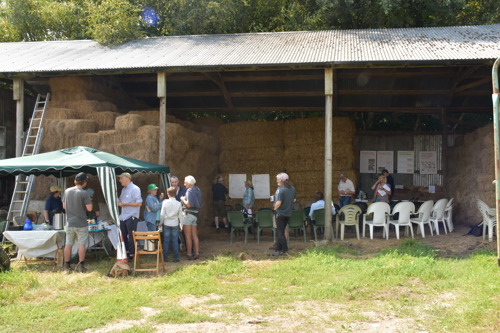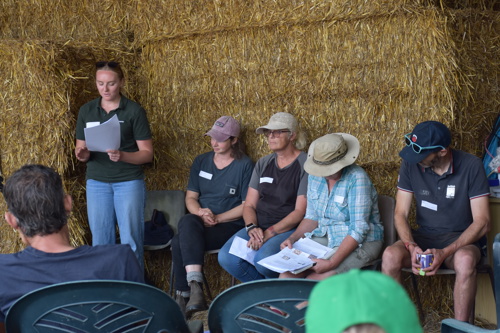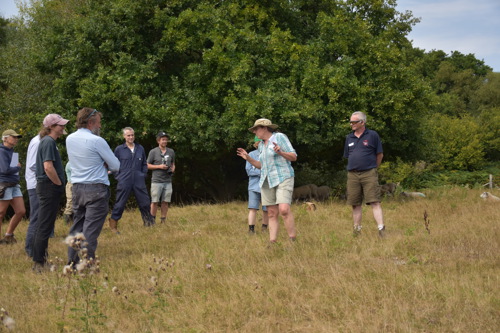Five organic and conventional sheep farmers in the SE of England are exploring the prevention and treatment of flystrike using natural alternatives to the commonly used chemical products.
Blowfly strike in sheep is a serious condition caused by blowfly larvae (maggots) feeding on sheep flesh. It is a significant welfare and economic problem for sheep farmers, affecting more than 75% of farms in the UK, and is said to cost the sheep industry over £2million per year. Due to climate change the UK is experiencing longer periods of blow fly activity and strike attacks.
The trial is evaluating whether natural products can:
- Delay and/or limit the use of conventional fly repellent sprays
- Prevent fly strike using natural alternatives during the active season
- Allow treatment of strike patches without endangering shepherd, sheep or the environment
The field lab will trial these natural products alongside the widely used existing chemical products.
For more information and updates click on the brown banner above.
How it works
Blowflies are the most widespread ecto-parasite affecting sheep in the UK. Virtually every sheep farm in the UK uses flystrike preventatives, the vast majority are chemicals such as synthetic pyrethroids.
Treatment of strike has implications for:
- The health and welfare for sheep, shepherd, and shearer.
- Fleece value following blow fly attack (chemically sprayed fleece has a lower value)
- Fleece scourers and processors
- The effect of these chemicals on soil and water sources (Synthetic pyrethroids are extremely toxic to aquatic life)
Current use of natural spray preventatives in the UK is low due to lack of knowledge and shorter durations of protection. The field lab will enable the gathering and dissemination of knowledge on efficacy and length of protection/reapplication times etc. on farm.
The field lab will also collect evidence on using a specific concentration of tea tree on strike patches, for ridding sheep of maggots and killing eggs.
Trial design
The trial is a three part approach to natural fly strike prevention and treatment.
Part 1: All the livestock involved will receive a fly strike prevention natural combination in their water troughs, and strike occurrence will be compared to surrounding farms.
Part 2: This will involve testing and comparing three spray-on products, one conventional and two natural alternative.
Part 3: The final part of the trial will be on the treatment of any strike patches – to compare:
- a tea tree essential oil formula,
- a proprietary natural product, ‘barrier hygiene blow fly repel’
- a conventional product to treat actual eggs and hatched maggot patches
An ethical protocol will be followed to ensure animals are all treated appropriately and timely to prevent needless suffering.
Update from the trial and on-farm event
Attendees headed to Brickpits Organic Farm in East Sussex for this event focused on the flystrike field lab. The trial began in April and is halfway through.

Background:
Blowfly strike in sheep is a serious condition caused by blowfly larvae (maggots) feeding on sheep flesh. It’s a significant welfare and economic problem for sheep farmers, affecting over 75% of farms in the UK and costing the sheep industry over £2 million every year. Due to climate change, the UK is experiencing longer periods of blow fly activity and strike attacks, making the trial an important one.
The true cost of the current commonly used chemicals to sheep, farmers, shepherds, shearers and the environment is often not spoken about. In addition, drug resistance can be an issue, as can lower values for chemically sprayed fleeces, along with the effect of these chemicals on water sources and on dung beetles, all of which are acknowledged by the manufactures on their datasheets.
The field lab is testing two off the shelf products for fly prevention and two for the treatment of strike patches, against what was usually used on each farm, alongside a product to boost the vitality of the sheep against attack from strike.
The event discussions:
At the event, the trial was discussed and everyone was updated about how alternative treatments are being used on the trialists’ farms and how they’re working so far. The trial is testing and raising awareness about off the shelf, natural, less harmful alternatives to chemical solutions.
Trial stage 1 – Raising vitality and resistance of sheep to parasites
Triallists used a homeopathic combination of remedies put together by Helios Homeopathic Pharmacy, then administered via drinking water. The remedies are designed to support the sheep’s innate vitality and resilience. They include:
- Cina – known to help with several parasite issues
- Staphysagria – commonly useful to the individuals that are more prone to parasite attack
- Sulphur – well recognised as being useful for helping boost the vitality to make sheep less prone to parasites.
- Psorinum – particularly useful for parasite issues affecting the skin
- Lav-ls – a specific remedy to help deal with the larval stages of flystrike
Feedback from farmers
Feedback has been positive, for example:
“Combo mix-easy to use, only downside for me is where I don’t have mains water to the majority of the fields, so it was a daily case of putting a few drops into the water buckets. I only saw one case of fly while using this and they were very small maggots which were just in the fleece not on the skin and didn’t seem to be causing any irritation to the sheep.”

Trial stage two – Preventatives
This stage focused on two natural alternatives, plus farmers’ usual treatments. Each group of sheep was divided into three, with a third receiving each treatment.
Preventative 1: The label states that it “gets rid of maggots and protects against further strike, and aids natural healing”. It lasts approximately four weeks before you need to reapply. It comes in 20 litre, 5 litre and 500ml packs and is suitable for organic systems.
Feedback from the farmers
Feedback from trialists was mixed, with down sides including
- the 5-litre bottle was “cumbersome to wear”
- the spray gun was weak,
- and that it’s not coloured, so is harder to see when applying in pens rather than at a race.
(Barrier Health who makes the product has taken these concerns on board and suggested solutions).
Some trialists also had positive results to share, such as one only having “one case of fly with using that”.
For Product 2 from Vetalis, the label states that it has “a biocidal effect and prevention against miasis flies, as well as other pests”. It lasts approximately four weeks before you need to reapply. This comes in 1 litre, 2.5 litre or 5 litre packs.
Farmer feedback:
This had a number of positive results, with one triallist calling it “my favourite for ease of application”. Others mentioned that it being coloured green was helpful, that “no flystrike problems were seen with this product”, and that “there’s no chemical smell”.
Trial stage three – Treatments – blow fly repel or tea tree oil mix.
The triallists used a treatment from Barrier Health which claims to rid sheep of maggots and protect against further strike and to aid natural healing, among other claimed benefits. This had positive feedback and clearly was “driving maggots out of fleece and any wound”.
Tea tree oil mix – lab research shows tea tree oil at 20% kills eggs, larvae and maggots. When used to treat sheep, it needs a carrier oil to make it easy to use and keep it on the fleece. Triallists used 20% tea tree oil in v-6 young living carrier oil, mixing the two.
Feedback from the farmers:
Overall, triallists found it effective.
One triallist said “Both the barrier and tea tree seem effective at killing maggots and stopping further strike”.
Flystrike field lab gets underway
The field lab has started well. The group had a successful initial meeting to go through the trial design and the practicalities on farm, so everyone is clear on the protocols.
The coordinator has delivered the tea tree oil and v6 mix, barrier animal health blow fly repel and the helios combination to each of the farmers. Oxylis has been hard to obtain as it has to be imported.
The group have set up a Whats app group to keep in contact, share knowledge and experiences and report updates, and blowfly sightings. One group member has already recorded blow fly sightings on the group chat. Another farmers has recorded and shared a video showing how to use the barrier blow fly repel to get maggots of the fleece which is really useful evidence.
Trial begins and stage 1 preventative combination added to water troughs
March 25
Coordinator check-ins with farmers
Fortnightly through the spring and summer
Farmer discussion group meeting, including vet
August 25
Finalising of results, analysis of data and conclusions shared in group
October 25
Final report due
December 25
Group Coordinator

Lynnie Hutchison
Brickpits Farm
East Sussex
Lynnie farms at Brickpits Farm, on organic mixed family farm in East Sussex. The farm produces organic beef and lamb for direct sales to customers and grow arable crops to support these enterprises. They have a Hereford beef suckler herd with two calvings a year and they lamb 150 ewes outside in April, a mix of Suffolk, Texel, and Lleyns. The farm has some permanent pasture and some arable land in rotation.
Researchers

Dr Lindsay Whistance
Organic Research Centre
UK
